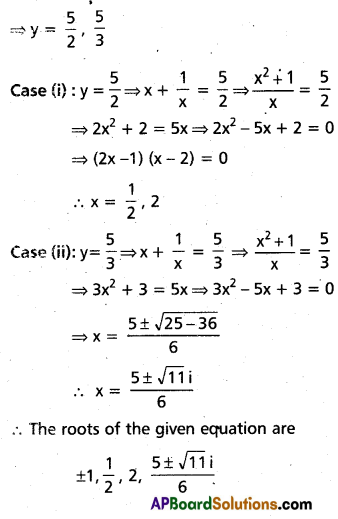Students get through Maths 2A Important Questions Inter 2nd Year Maths 2A Theory of Equations Important Questions which are most likely to be asked in the exam.
Intermediate 2nd Year Maths 2A Theory of Equations Important Questions
Question 1.
Form polynomial equation of the lowest degree, with roots 1, -1, 3 (May ’06)
Hint : Equation having roots, α, β, γ is [(x – α)(x – β)(x – γ) = 0
Solution:
Required equation is
(x – 1) (x + 1) (x – 3) = 0
⇒ (x2 – 1) (x – 3) = 0
⇒ -3x2 – x + 3 = 0
Question 2.
If 1, 1 α are the roots of
x3 – 6x2 + 9x – 4 = 0, then find α. (May 11)
Solution:
1, 1, α are roots of x3 – 6x2 + 9x – 4 = 0
Sum = 1 + 1 + α = 6
α = 6 – 2 = 4
![]()
Question 3.
If -1, 2 and α are the roots of 2x3 + x2 – 7x – 6 = 0, then find α (Mar 14, 13)
Solution:
-1, 2, α are roots of 2x3 + x2 – 7x – 6 = 0
sum = -1 + 2 + α = –\(\frac{1}{2}\)
α = –\(\frac{1}{2}\) – 1 = –\(\frac{3}{2}\)
Question 4.
If 1, -2 and 3 are roots of x3 – 2x2 + ax + 6 = 0, then find α. (Mar. ’04,)
Solution:
1, -2 and 3 are roots of x3 + x2 + ax – 6 = 0
x3 – 2x + ax + 6 = 0
⇒ 1(-2) + (-2) 3 + 3. 1 = a
i.e., a = -2 – 6 + 3 = -5
Question 5.
If the product of the roots of 4x3 + 16x2 – 9x – a = 0 is 9, then find a. (TS Mar. ’17, ’16)
Solution:
α, β, γ are the roots of
4x3 + 16x2 – 9x – a = 0
αβγ = \(\frac{a}{4}\) = 9 ⇒ a = 36
Question 6.
Find the transformed equation whose roots are the negative of the roots of
x4 + 5x3 + 11x + 3 = 0
Solution:
Given f(x) = x4 + 5x3 + 11x + 3 = 0
We want an equation whose roots are
-α1, α2, α3, α4,
Required equation f(-x) = 0
⇒ (-x)4 + 5 (-x)3 + 11 (-x) + 3 = 0
⇒ x4 – 5x3 – 11x + 3 = 0
Question 7.
Form the polynomial equation of degree 3 whose roots are 2, 3 and, 6.
Solution:
The required polynomial equation is,
(x – 2) (x – 3) (x – 6) = 0
⇒ x3 – 11x2 + 36x – 36 = 0
![]()
Question 8.
Let α, β, γ be the roots of Σα3
Solution:
Σα3 = α3 + β3 + γ3
= (α + β + γ)
= (α2 + β2 + γ2 – αβ – βγ – γα) + 3αβγ
= (-p)(p2 – 2q – q) – 3r
= -p(p2 – 3q) – 3r
∴ Σα3 = -p3 + 3pq – 3r = 3pq – p3 – 3r
Question 9.
If α, β and 1 are the roots of x3 – 2x2 – 5x + 6 = 0, then find α and β (AP Mår ’16, ’08)
Solution:
α, β and 1 are the roots of
x3 – 2x2 – 5x + 6 = 0
Sum = α + β + 1 = 2 ⇒ α + β = 1
product = αβ = -6
(α – β)2 = (α + β )2 – 4αβ = 1 + 24 = 25
α – β = 5
α + β = 1
Adding 2α = 6 ⇒ α = 3
∴ α = 3 and β = -2
Question 10.
If α, β and γ are the roots of x3 – 2x2 + 3x – 4 = 0, then find
i) Σα2β2
ii) Σαβ (α + β)
Solution:
Since α, β, γ are the roots of
x3 – 2x2 + 3x – 4 = 0
then α + β + γ = 2
αβ + βγ + γα = 3
αβγ = 4
i) Σα2β2 = α2β2 + β2γ2 + γ2α2
= (αβ + βγ + γα)2 – 2αβγ(α + β + γ)
= 9 – 2. 2.4 = 9 – 16 = -7
ii) Σαβ (α + β) = α2β + β2γ + γ2α + αβ2 + βγ2 + γα2
= (αβ + βγ + γα)(α + β + γ) – 3αβγ
= 2.3 – 3.4 = 6 – 12 = -6.
![]()
Question 11.
Solve the x3 – 3x2 – 6x + 8 = 0 equation, given that the roots of each are in A.P. (‘Mar. ’07)
Solution:
The roots of x3 – 3x2 – 6x + 8 = 0 are in A.P
Suppose a – d, a, a + d be the roots
Sum = a – d + a + a + d = 3
3a = 3
⇒ a = 1
∴ (x – 1) is a factor of x3 – 3x2 – 6x + 8 = 0

⇒ x2 – 2x – 8 = 0
⇒ x2 – 4x + 2x – 8 = 0
⇒ x(x – 4) + 2(x – 4) = 0
⇒ x = 4, -2
∴ The roots are -2, 1, 4.
Question 12.
Solve x4 – 4x2 + 8x + 35 = 0, given that 2 + i \(\sqrt{3}\) is a root (AP Mar. ’15)
Solution:
Let 2 + i \(\sqrt{3}\) is one root
⇒ 2 – i \(\sqrt{3}\) is another root.
The equation having roots
2 ± i \(\sqrt{3}\) is x2 – 4x + 7 = 0
∴ x2 – 4x + 7 is a factor of
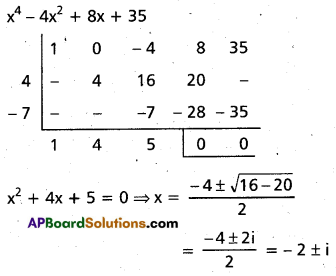
∴ The roots of the given equation are 2 ± i\(\sqrt{3}\), -2 ± i
Question 13.
Find the polynomial equation whose roots are the reciprocals of the roots of x4 – 3x3 + 7x2 + 5x – 2 = 0 (TS Mar. ’15, ’11)
Solution:
Given equation is
f(x) = x4 – 3x3 + 7x2 + 5x – 2 = 0
Required equation is f(\(\frac{1}{x}\)) = 0
i.e. \(\frac{1}{x^{4}}\) – \(\frac{3}{x^{3}}\) + \(\frac{7}{x^{2}}\) + \(\frac{5}{x}\) – 2 = 0
Multiplying with x4
⇒ 1 – 3x + 7x2 + 5x3 – 2x4 = 0
i.e., 2x4 – 5x3 – 7x2 + 3x – 1 = 0
Question 14.
Find the polynomial equation whose roots are the translates of those of x5 – 4x4 + 3x2 – 4x + 6 = 0 by -3. (TS Mar. 16)
Solution:
Given equation is
f(x) = x5 – 4x4 + 3x2 – 4x + 6 = 0
Required equation is f(x + 3) = 0
(x + 3)5 – 4(x + 3)4 + 3(x + 3)2
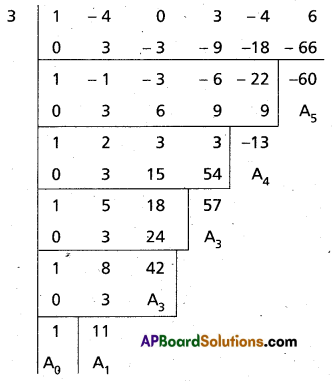
Required equation is
x5 + 11x4 + 42x3 + 57x2 – 13x – 60 = 0
![]()
Question 15.
Show that x5 – 5x3 + 5x2 – 1 = 0 has three equal roots and find this root. (TS Mar. ’17)
Solution:
Let f(x) = x5 – 5x3 + 5x2 – 1
f'(x) = 5x4 – 15x2 + 10x
= 5x (x3 – 3x + 2)
f'(1) = 5(1) (1 – 3 + 2) = 0
f(1) = 1 – 5 + 5 – 1 = 0
x – 1 is a factor of f'(x) and f(x)
∴ 1 is a repeated’ root of f(x).
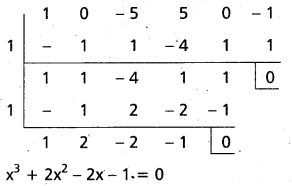
⇒ 1 is a root of above equation
(∵ sum of the coefficients is zero)
∴ 1 is the required root.
Question 16.
Solve the 8x3 – 36x2 – 18x + 81 = 0 equation, given that the roots of each are in AP. (Mar. 04’)
Soluution:
Given the roots of 8x3 – 36x2 – 18x + 81 = 0 are in AP.
Let the roots be a – d, a, a + d
Sum of the roots = a – d + a + a + d
= \(\frac{36}{8}\) = \(\frac{9}{2}\)
i.e., 3a = \(\frac{9}{2}\) ⇒ a = \(\frac{3}{2}\)
∴ (x – \(\frac{3}{2}\)) is a factor of
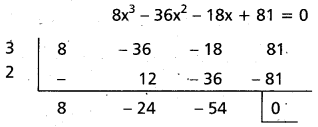
⇒ 8x2 – 24x – 54 = 0
⇒ 4x2 – 12x – 27 = 0
⇒ 4x2 – 18x + 6x – 27 = 0
⇒ 2x(2x – 9) + 3 (2x – 9) = 0
⇒ (2x + 3) (2x – 9) = 0
⇒ x = –\(\frac{3}{2}\), \(\frac{9}{2}\)
The roots are –\(\frac{3}{2}\), \(\frac{3}{2}\), \(\frac{9}{2}\)
Question 17.
Solve the 3x3 – 26x2 + 52x – 24 = 0 equations, given that the roots of each are in GP.
(TS Mar. ’15)
Solution:
Given equation is 3x3 – 26x2 + 52x – 24 = 0
The roots are in G.P.
Suppose \(\frac{a}{r}\), a, ar are the roots.
Product = \(\frac{a}{r}\).a.ar = –\(\left(-\frac{24}{3}\right)\)
a3 = 8 ⇒ a = 2
∴ (x – 2) is a factor of 3x3 – 26x2 + 52x – 24
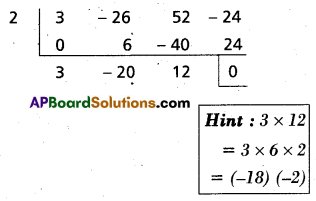
⇒ 3x3 – 20x + 12 = 0
⇒ 3x2 – 18x – 2x + 12 = 0
⇒ 3x (x – 6) -2 (x – 6) = 0
⇒ (3x – 2)(x – 6) = 0
⇒ x = \(\frac{2}{3}\), 6
∴ The roots are \(\frac{2}{3}\), 2, 6.
Question 18.
Solve 18x3 + 81x2 + 121x + 60 = 0 given that one root is equal to half the sum of the
remaining roots. (May ’11; Mar. ’05)
Solution:
Suppose α, β, γ are the roots of 18x3 + 81x2 + 121x + 60 = 0.
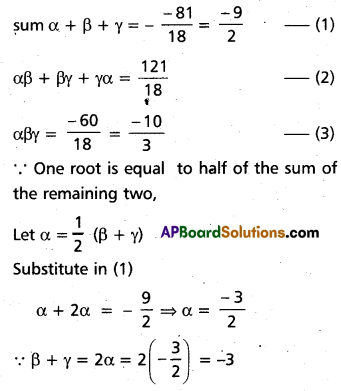
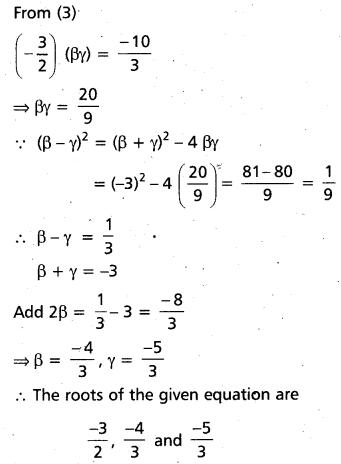
![]()
Question 19.
Solve the equation
2x5 + x4 – 12x3 – 12x2 + x + 2 = 0 (AP Mar.17, 16; Mar. ‘08, 07)
Solution:
Given f(x) = 2x5 + x4 – 12x3 – 12x2 + x + 2 = 0
This is an odd degree reciprocal equation of first type.
∴ -1 is a root.
Dividing f(x) with x + 1
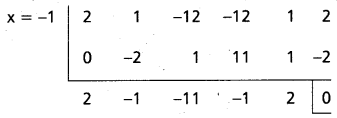
Dividing f(x) by (x + 1) we get
2x4 – x3 – 11x2 – x + 2 = 0
Dividing by x2
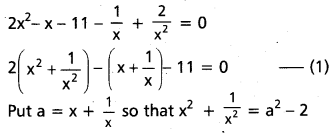
Substituting in (1), required equation is
2(a2 – 2) – a – 11 = 0 .
2a2 – 4 – a – 11 = 0
2a2 – a – 15 = 0
(a – 3)(2a + 5) = 0
a = 3 or \(-\frac{5}{2}\)
Case (i) a = 3
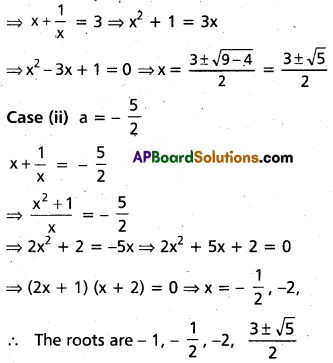
Question 20.
Find the roots of
x4 – 16x3 + 86x2 – 176x + 105 = 0
Solution:
Let f(x) = x4 – 16x3 + 86x2 – 176x + 105
Now, f(1) = 1 – 16 + 86 – 176 + 105 = 0
∴ 1 is a root of f(x) = 0
⇒ x – 1 is a factor of f(x)
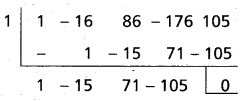
∴ f(x) = (x – 1) (x3 – 15x2 + 71x – 105)
= (x – 1) g(x) where
g(x) = x3 – 15x2 + 71x – 105
g(1) = 1 – 15 + 71 – 105 = -48 ≠ 0
g(2) = -15 ≠ 0
g(3) = 27 – 135 + 213 – 105 = 0
∴ 3 is a root of g(x) =0
⇒ x – 3 is a factor of g(x)
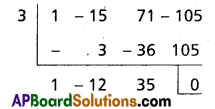
∴ g(x) = (x – 3) (x2 – 12x + 35)
= (x – 3) (x – 5) (x – 7)
∴ f(x) = (x – 1) (x – 3) (x – 5) (x – 7)
∴ 1, 3, 5, 7 are the roots of f(x) = 0.
Question 21.
Solve 4x3 – 24x2 + 23x + 18 = 0, given that the roots of this equation are in arithmetic progression (Mar. ’14; May ’06)
Solution:
Let a – d, a, a + d are the roots of the given equation
Now, sum of the roots
a – d + a + a + d = \(\frac{24}{4}\)
3a = 6
a = 2
Product of the roots (a – d) a (a + d) = \(-\frac{18}{4}\)
a(a2 – d) = \(-\frac{9}{2}\)
2(4 – d2) = \(-\frac{9}{2}\)
4(4 – d2) = -9
16 – 4d2 = -9
4d2 = 25
d = ±\(\frac{5}{2}\)
∴ roots are –\(\frac{1}{2}\), 2 and \(\frac{9}{2}\)
Question 22.
Find the polynomial equation whose roots are the squares of the roots of x5 + 4x3 – x2 + 11 = 0 by -3. (Mar. ’06)
Solution:
Let f (x) ≡ x5 + 4x3 – x2 + 11
The required equation is f(x + 3) = 0
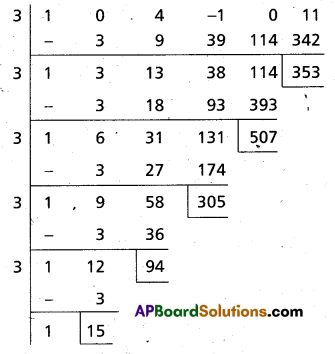
The required equation is
x5 + 15x4 + 94x3 + 305x2 + 507x + 353 = 0
![]()
Question 23.
Solve the equation 6x4 – 35x3 + 62x2 – 35x + 6 = 0. (May. 13)
Solution:
We observe that the given equation is an even degree reciprocal equation of class one. On dividing both sides of the given equation by x2, we get
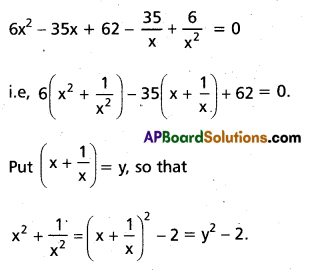
Then the above equation reduces to
6(y2 – 2) – 35y + 62 = 0
i.e., 6y2 – 35y + 50 = 0
i.e., (2y – 5)(3y – 10) = 0.
Hence the roots of 6y2 – 35y + 50 = 0 are \(\frac{5}{2}\) and \(\frac{10}{3}\).
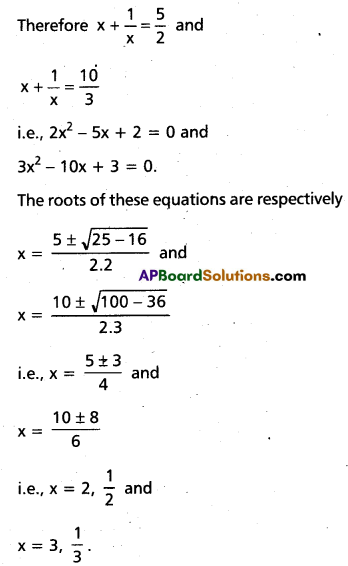
Hence the roots of the given equation are \(\frac{1}{2}\), \(\frac{1}{3}\), 2 and 3.
Question 24.
Solve x5 – 5x4 + 9x3 – 9x2 + 5x – 1 = 0. (Mar. ’13)
Solution:
Given equation is
x5 – 5x4 + 9x3 – 9x2 + 5x – 1 = 0 is a reciprocal equation of odd degree and of class two.
∴ 1 is a root of the given equation.
⇒ (x – 1) is a factor of
x5 + 4x3 + 5x2 – 4x2 + 1 = 0
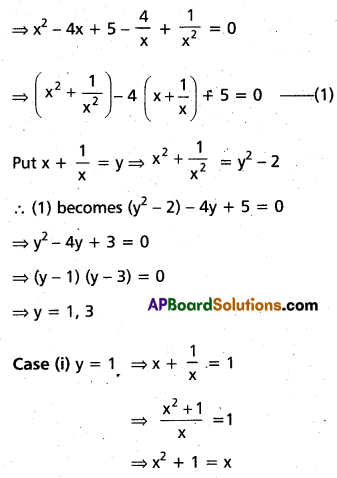
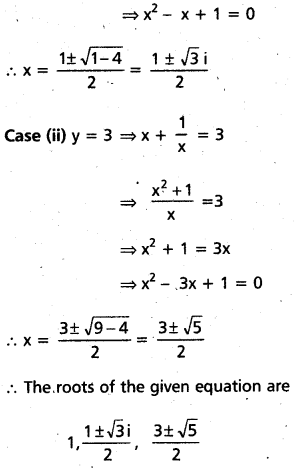
Question 25.
Form the polynomial equation of degree 3 whose roots are 2, 3 and 6. (Mar. ’02)
Solution:
The required polynomial equation is,
(x – 2) (x – 3)(x – 6) = 0
⇒ x3 – 11x3 + 36x – 36 = 0
Question 26.
Find the relation between the roots and the coefficients of the cubic equation
3x3 – 10x2 + 7x + 10 = 0.
Solution:
3x3 – 10x2 + 7x + 1o = 0 ———- (1)
On.comparing (1) with
ax3 + bx2 + cx + d = 0,
we have
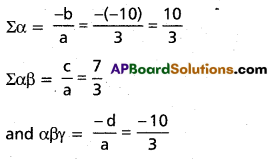
![]()
Question 27.
Write down the relations between the roots and the coefficients of the bi-quadratic equation.
x4 – 2x3 + 4x2 + 6x – 21 = 0
Solution:
Given equation is
x4 – 2x3 + 4x2 + 6x – 21 = 0 —— (1)
On comparing (1) with
ax4 + bx3 + cx2 + dx + c = 0,
we have
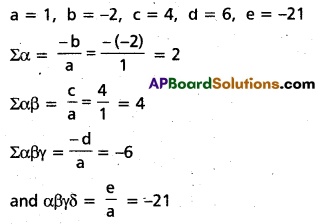
Question 28.
If 1, 2, 3 and 4 are the roots of x4 + ax3 + bx2 + cx + d = 0, then find the
values of a, b, c and d.
Solution:
Given that the roots of the given equation are 1, 2, 3 and 4. Then
x4 + ax3 + bx2 + cx + d
≡ (x – 1) (x – 2) (x – 3) (x – 4) = 0
≡ x4 – 10x3 + 35x2 – 50x + 24 = 0
On equating the coefficients of like powers of x, we obtain
a = -10, b = 35, c = -50, d = 24
Question 29.
if a, b, c are the roots of
x3 – px2 + qx- r = 0 and r ≠ 0, then find \(\frac{1}{\mathbf{a}^{2}}+\frac{1}{\mathbf{b}^{2}}+\frac{1}{\mathrm{c}^{2}}\) interms of p, q, r.
Solution:
Given that a, b, c are the roots of
x3 – px2 + qx – r = 0, then
a + b + c = p, ab + bc + ca = q, abc = r
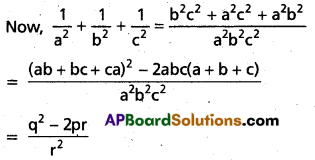
Question 30.
Find the sum of the squares and the sum of the cubes of the roots of the equation x3 – px2 + qx – r = 0 in terms of p, q, r.
Solution:
Let α, β, γ be the roots of the given equation then α + β + γ = p, αβ + βγ + γα = q, αβγ = r
Sum of the squares of the roots is α2 + β2 + γ2
= (α + β + γ)2 – 2(αβ + βγ + γα) = p2 – 2q
Sum of the cubes of the roots is α3 + β3 + γ3
= (α + β + γ) (α2 + β2 + γ2 – αβ – βγ – γα) + 3αβγ
= p(p2 – 2q – q) + 3r
= p(p2 – 3q) + 3r
Question 31.
Obtain the cubic equation, whose roots are the sqüares of the roots of the equation, x3 + p1x2 + P2x + p3 = 0
Solution:
The required equation is, f(\(\sqrt{x}\)) =0
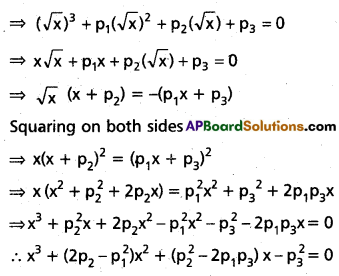
Question 32.
Let α, β, γ be the roots of
x3 + px2 + qx + r = 0. Then find the
i) Σα2
ii) Σ\(\frac{1}{\alpha}\)
iii) Σα3
iv) Σβ2γ2
v) Σ(α + β) (β + γ) (γ + α)
Solution:
since α, β, γ are the roots of the equation, we have α + β + γ = – p,
αβ + βγ + γα = q, αβγ = -r.
i) Σα2
Solution:
Σα2 = α2 + β2 + γ2
= (α + β + γ) – 2(αβ + βγ + γα)
= p2 – 2q
ii) Σ\(\frac{1}{\alpha}\)
Solution:

![]()
iii) Σα3
Solution:
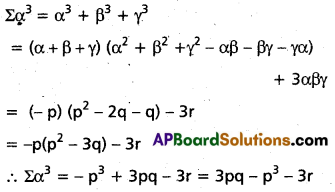
iv) Σβ2γ2
Solution:
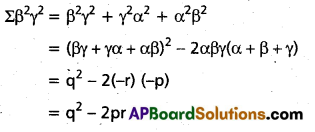
v) (α + β) (β + γ) (γ + α)
Solution:
We know, α + β + γ = -p
⇒ α + β = -p – r and β + γ = -p – α
= γ + α = -p – β
∴ (α + β) (β + γ)(γ + α)
= (-p – γ) (-p – α) (-p – β)
= -p3 – p2(α + β + γ) – p(αβ + βγ + γα) – αβγ
= -p3 + p3 – pq + r = r – pq .
Question 33.
Let α, β, γ be the roots of
x3 + ax2 + bx + c = 0 then find Σα2 + Σβ2
Solution:
Since α, β, γ are roots of the given equation,
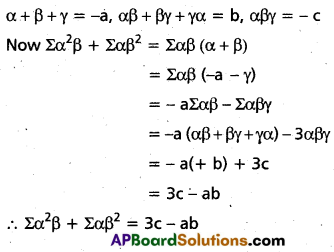
Question 34.
If α, β, γ are the roots of x3 + px2 + qx + r = 0, then form the cubic equation whose roots are .
α(β + γ), β(γ + α), γ(α + β)
Solution:
Let α, β, γ be the roots of the given equation.
we have, α + β + γ = – p, αβ + βγ + γα = q, αβγ = -r
Let y = α(β + γ)
= αβ + αγ + γβ – βγ
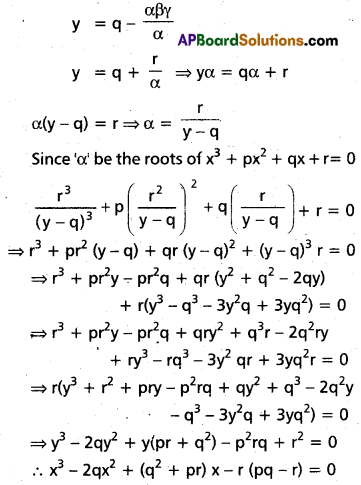
![]()
Question 35.
Solve x3 – 3x2 – 16x + 48 = 0
Solution:
Let f(x) = x3 – 3x2 – 16x + 48
by inspection, f(3) = 0
Hence 3 is a root of 1(x) = 0
Now we divide f(x) by (x – 3)
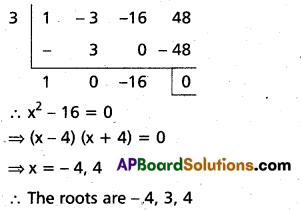
Question 36.
Find the roots of
x4 – 16x3 + 86x2 – 176x + 105 = 0 (Mar. ‘02)
Solution:
Let f(x) = x4 – 16x3 + 86x2 – 176x + 105
Now if (1) = 1 – 16 + 86 – 176 + 105 = 0
∴ 1 is a root of f(x) = 0
⇒ x – 1 is a factor of f(x)
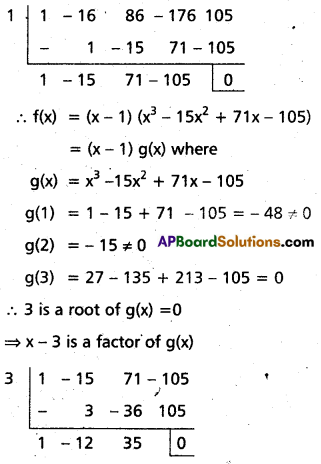
∴ g(x) = (x – 3)(x2 – 12x + 35)
= (x – 3) (x – 5) (x – 7)
∴ f(x) = (x – 1) (x – 3) (x – 5) (x – 7)
∴ 1, 3, 5, 7 are the roots of f(x) = 0.
Question 37.
Solve x3 – 7x2 + 36 = 0, given one root being twice the other.
Solution:
Let α, β, γ be the root of the equation
x3 – 7x2 + 36 = 0 and
let β = 2α
Now, we have, α + β + γ = 7
⇒ 3α + γ = 7 —— (1)
αβ + βγ + γα = 0
⇒ 2α2 + 3αγ = 0 —— (2)
αβγ = -36 ⇒ 2α2γ = -36 —— (3)
From (1) and (2), we have
2α2 + 3α(7 – 3α) = 0
i.e., α2 – 3α = 0 (or) α(α – 3) = 0
∴ α = 0 or α = 3
Since α = 0 does not satisfy the given equation.
∴ α = 3, so β = 6 and γ = -2
∴ The roots are 3, 6, -2.
Question 38.
Given that 2 is a root of
x3 – 6x2 + 3x + 1o = 0, find the other roots.
Solution:
Let f(x) = x3 – 6x2 + 3x + 10
Since 2 is a root of f(x) = 0, we divide f(x) by (x – 2)
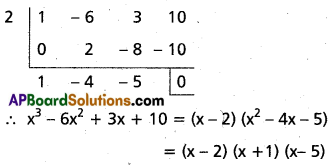
∴ -1, 2, and 5 are the roots of the given equation.
Question 39.
Given that two roots of
4x3 + 20x2 – 23x + 6 = 0 are equal, find all the roots of the given equation.
Solution:
Let α, β, γ are the roots of
4x3 + 20x2 – 23x + 6 = 0
Given two roots are equal, let α = β
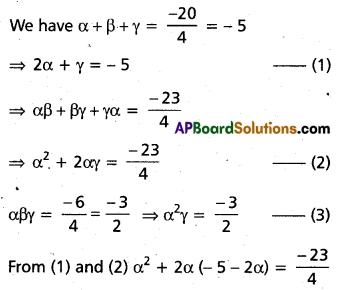
⇒ 12α2 + 4α – 23 = 0
⇒ (2α – 1) (6α + 23) = 0
α = \(\frac{1}{2}\), α = \(\frac{-23}{6}\)
On verfication, we get that is a root of (1)
α = \(\frac{1}{2}\) is roots of (1)
(2) ⇒ roots are \(\frac{1}{2}\), \(\frac{1}{2}\), -6
![]()
Question 40.
Given that the sum of two roots of
x4 – 2x3 + 4x2 + 6x – 21 = 0 is zero find the roots of the equation.
Solution:
Let α, β, γ, δ are the roots of given equation, since sum of two is zero.
α + β = 0
Now α + β + γ + δ = 2 ⇒ γ + δ = 2
Let αβ = p, γδ = q
The equation having the roots α, β is
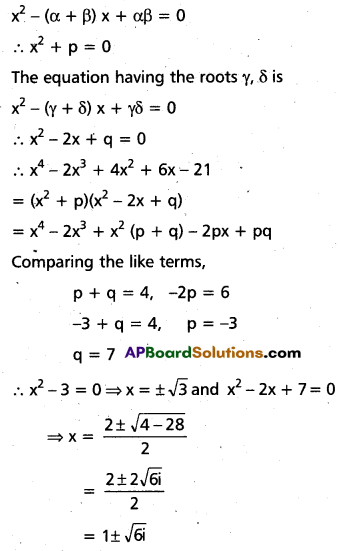
∴ Roots are –\(\sqrt{3}\), \(\sqrt{3}\), 1 – i \(\sqrt{6}\) and 1 + i \(\sqrt{6}\)
Question 41.
Solve 4x3 – 24x2 + 23x + 18 = 0, given that the roots of this equation are in arithmetic progression. (Mar. 14, May ‘06)
Solution:
Let a – d, a, a + d are the roots of the given equation
Now, sum of the roots
a – d + a + a + d = \(\frac{24}{4}\)
3a = 6
a = 2
Product of the roots (a – d) a (a + d) = \(\frac{-18}{4}\)
a(a2 – d2) = \(\frac{-9}{2}\)
2(4 – d2) = \(\frac{-9}{2}\)
4(4 – d2) = -9
16 – d2 = -9
4d2 = 25
d = ± \(\frac{5}{2}\)
∴ roots are –\(\frac{1}{2}\), 2 and \(\frac{9}{2}\)
Question 42.
Solve x3 – 7x2 + 14x – 8 = 0, given that the roots are in geometric progression.
Solution:
Let \(\frac{a}{r}\), a, ar be the roots of the given equation. Then .
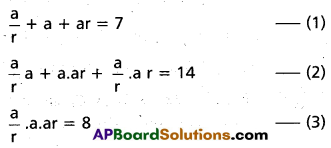
Hence a = 2. On substituting a = 2 in (1), we obtain
\(\frac{2}{r}\) + 2 + 2r = 7
i.e., 2r2 – 5r + 2 = 0
i.e., (r – 2) (2r – 1) = 0
Therefore r = 2 or r = \(\frac{1}{2}\)
Hence the roots of the given equation are 1, 2 and 4.
Question 43.
Solve x4 – 5x3 + 5x2 + 5x – 6 = 0 given that the product of two of its roots is 3.
Solution:
Let α, β, γ, δ be the roots of the given equation.
Product of the roots αβγδ = -6
Given αβ = 3 (∵ Product of two roots is 3)
∴ α, β, γ, δ = -6
γδ = -2
Let α + β, γ + δ = q
The equation having the roots α,β is
x2 – (α + β) x + αβ = 0
x2 + px + 3 = 0
The equation having the roots γ, δ is
x2 – (γ + δ)x + γδ = 0
x2 – qx – 2 = 0
∴ x4 – 5x3 + 5x2 + 5x – 6
= (x2 – px + 3)(x2 – qx – 2)
= x4 – (p + q)x3 + (1 + pq)x2 + (2p – 3q)x – 6
Comparing the like terms,
p + q = 5, 2p – 3q = 5
∴ 2p – 3q = 5
3p + 3q = 15
5p = 20 ⇒ p = 4
∴ q = 1
Now x2 – 4x + 3 = 0 ⇒ (x – 3)(x – 1) = 0
⇒ x = 1, 3
x2 – x – 2 = 0 ⇒ (x – 2)(x + 1) = 0
⇒ x = -1, 2
∴ The roots are -1, 2, 1, 3
![]()
Question 44.
Solve x6 + 4x3 – 2x2 – 12x + 9 = 0, Given that it has two pairš of equal roots.
Solution:
Given equation is
x4 + 4x3 – 2x2 – 12x + 9 = 0
Let the roots be α, α, β, β
Sum of the roots, 2(α + β) = -4
⇒ α + β = -2
Let αβ = p
The equation having roots α, β is
x2 – (α + β)x + αβ = 0
i.e. x2 + 2x + p = 0
∴ x4 + 4x3 – 2x2 – 12x + 9
= [x2 – (α + β)x + αβ]2
= (x2 + 2x + p)2
= x4 + 4x3 + (2p + 4)x2 + 4px + p2
Comparing coefficients of x on both sides
4p = -12 ⇒ p = – 3
x2 + 2x + p = 0 ⇒ x2 + 2x – 3 = 0
⇒ (x + 3)(x – 1) = 0
⇒ x = -3, 1
∴ The roots of the given equation are -3, -3, 1, 1
Question 45.
Prove that the sum of any two of the roots of the equation x4 + px3 + qx2 + rx + s = 0 is equal to the sum of the remaining two roots of the equation iff p3 – 4pq + 8r = 0.
Solution:
Suppose that the sum of two of the roots of the given equation is equal to the sum of the remaining two roots.
Let α, β, γ, δ be roots of the given equation such that α + β = γ + δ
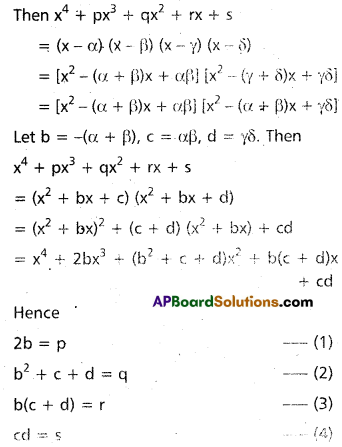
From these equations, we have
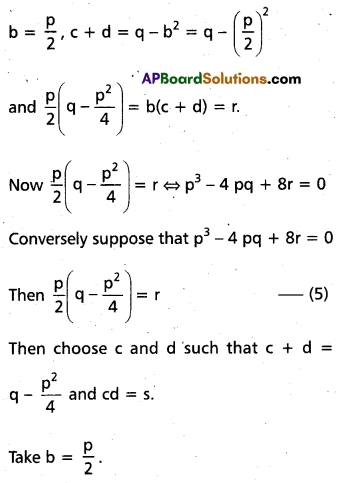
Then equations (1), (2) and (4) are satisfied. In view of (5), equation (3) is also satisfied. Hence (x2 + bx + c)(x2 + bx + d) = x4 + 2bx3 + (b2 + c + d)x2 + b(c + d)x + cd = x4 + px3 + qx2 + rx + s
Hence the roots of the given equation are α1, β1, γ1 and δ1. where α1 and β1 are the roots of the equations x2 + bx + c = 0 and γ1 and δ1 are those of the equation x2 + bx + d = 0.
We have α1 + β1 = -b = γ1 + δ1.
Question 46.
Form the polynomial equation of degree 4 whose roots are
4 + \(\sqrt{3}\), 4 – \(\sqrt{3}\), 2 + i and 2 – i
Solution:
The equation having roots 4 + \(\sqrt{3}\), 4 – \(\sqrt{3}\) is
x2 – 8x + 13 = 0
The equation having roots 2 + i, 2 – i is
x2 – 4x + 5 = 0.
The required equation is
(x2 – 8x + 13) (x2 – 4x + 5) = 0
∴ x4 – 12x3 + 50x2 – 92x + 65 = 0
Question 47.
Solve 6x4 – 13x3 – 35x2 – x + 3 = 0 given that one of its root is 2 + \(\sqrt{3}\).
Solution:
2 + \(\sqrt{3}\) is a root 2 – \(\sqrt{3}\) is also a root.
The equation having roots
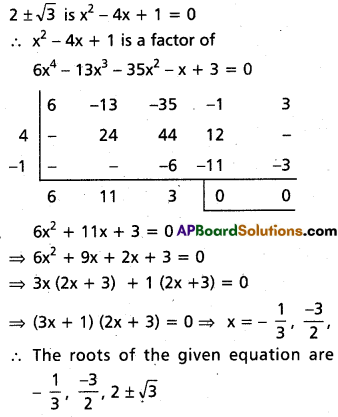
Question 48.
Find the polynomial equation of degree 4 whose roots are the negatives of the roots of x4 – 6x3 + 7x2 – 2x + 1 = 0
Solution:
Let f(x) ≡ x4 – 6x3 + 7x2 – 2x + 1
The required equation is f(-x) = 0
i.e., (-x)4 – 6(-x)3 + 7(-x)2 + 2(-x) + 1 = 0
∴ x4 + 6x3 + 7x2 + 2x + 1 = 0
Question 49.
Find the algebraic equation of the degree 4 whose roots are 3 times the roots of the equation
6x4 – 7x3 + 8x2 – 7x + 2 = 0
Solution:
Let f(x) ≡ 6x4 – 7x3 + 8x2 – 7x +2
The required equation is f\(\left(\frac{x}{3}\right)\) = o
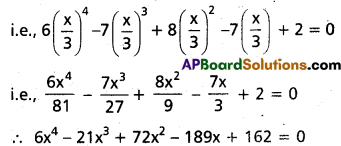
Question 50.
Form the equation whose roots are m times the roots of the equation x3 + \(\frac{x^{2}}{4}\) – \(\frac{x}{16}\) + \(\frac{1}{72}\) = 0 and deduce the case when m = 12.
Solution:
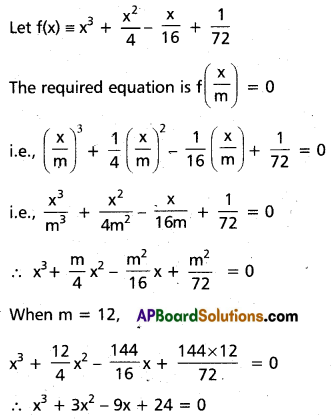
Question 51.
Find the algebraic equation of degree 5 whose roots are the translates of the roots of x5 + 4x3 – x2 + 11 = 0 by -3. (Mar. ’06)
Solution:
Let f (x) ≡ x5 + 4x3 – x2 + 11
The required equation is f(x + 3) = 0
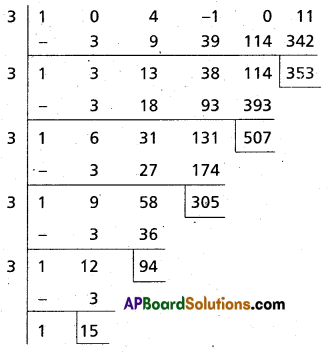
The required equation is
x5 + 15x4 + 94x3 + 305x2 + 507x + 353 = 0
Question 52.
Find the algebraic equation of degree 4 whose roots are the translates of the roots
4x4 + 32x3 + 83x2 + 76x + 21 = 0 by 2.
Solution:
Let f(x) ≡ 4x4 + 32x3 + 83x2 + 76x + 21
The required equation is f(x – 2) = 0
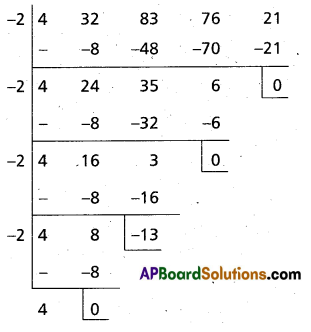
The required equation is
4x4 – 13x2 + 9 = 0
Question 53.
Find the polynomial equation whose roots are the reciprocals of the roots of the equation
x4 + 3x3 – 6x2 + 2x -4 = 0
Solution:
Let f(x) ≡ x4 + 3x3 – 6x2 + 2x – 4
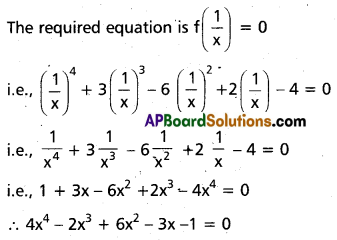
Question 54.
Find the polynomial equation whose roots are the squares of the roots of x3 – x2 + 8x – 6 = 0
Solution:
Let f(x) ≡ x3 – x2 + 8x – 6 .
The required equation is f(\(\sqrt{x}\)) = o

Squaring on both sides
⇒ x(x2 + 16x + 64) = x2 + 12x + 36
= x3 + 6x2 + 64x – x2 – 12x – 36 = 0
∴ x3 + 15x2 + 52x – 36 = 0
![]()
Question 55.
Show that 2x3 + 5x2 + 5x + 2 = 0 is a reciprocal equation of class one.
Solution:
Given equation is 2x3 + 5x2 + 5x + 2 = 0
P0 = 2, p1 = 5, P2 = 5, p3 = 2
Here P0 = p3, p1 = p2
∴ The equation 2x3 + 5x2 + 5x + 2 = 0 is a reciprocal equation of class one.
Question 56.
Solve the equation
4x3 – 13x2 – 13x + 4 = 0
Solution:
4x3 – 13x2 – 13x + 4 = 0 is a reciprocal equation of first class and of odd degree.
Thus -1 is a root of the 9iven equation.
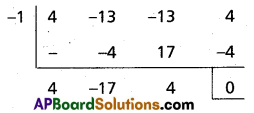
4x2 – 17x + 4 = 0 ⇒ 4x2 – 16x – x + 4 = 0
⇒ 4x(x – 4) – 1 (x – 4) = 0
⇒ (x – 4)(4x – 1) = 0
⇒ x = 4 or \(\frac{1}{4}\)
The roots are -1, 4, \(\frac{1}{4}\)
Question 57.
Solve the equation 6x4 – 35x3 + 62x2 – 35x + 6 = 0. (May ‘13)
Solution:
We observe that the given equation is an even degree reciprocal equation of class one.
On dividing both sides 6f the given equation by x2, we get
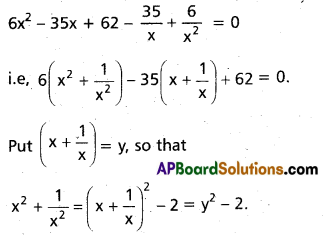
Then the above equation reduces to
6(y2 – 2) – 35y + 62 = 0
i.e., 6y2 – 35y + 50 = 0
i.e., (2y – 5) (3y – 10) = 0.
Hence the roots of 6y2 – 35y + 50 = 0 are \(\frac{5}{2}\) and \(\frac{10}{3}\).
Therefore x + \(\frac{1}{x}\) = \(\frac{5}{2}\) and x + \(\frac{1}{x}\) = \(\frac{10}{3}\)
i.e., 2x2 – 5x + 2 = 0 and 3x2 – 10x + 3 = 0.
The roots of these equations are respectively
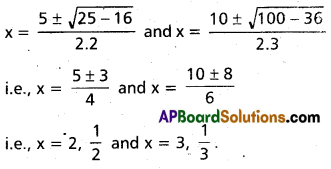
Hence the roots of the given equation are \(\frac{1}{2}\), \(\frac{1}{3}\), 2 and 3.
Question 58.
Solve x5 – 5x4 – 9x3 – 9x2 + 5x – 1 = 0. (Mar ’13)
Solution:
Given equation is
x5 – 5x4 + 9x3 – 9x2 + 5x – 1 = 0 is a reciprocal equation’of odd degree and of class two.
∴ 1 is a root of the given equation.
⇒ (x – 1) is a factor of
x5 – 5x4 + 9x3 – 9x2 + 5x – 1 = 0
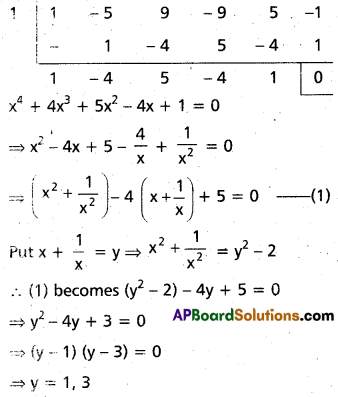
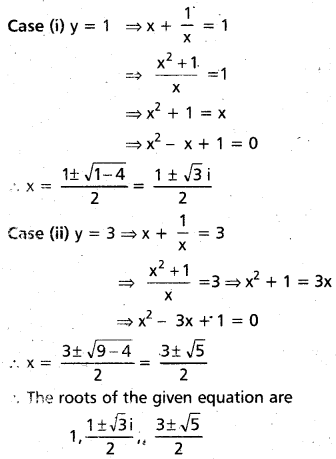
Question 59.
Solve the equation
6x6 – 25x5 + 31x4 – 31x2 + 25x – 6 = 0
Solution:
Given equation is
6x6 – 25x5 + 31x4 – 31x2 + 25x – 6 = 0 is a reciprocal equation of second class and of even degree.
∴ x2 – 1 is a factor of
6x6 – 25x5 + 31x4 – 31x2 + 25x – 6 = 0
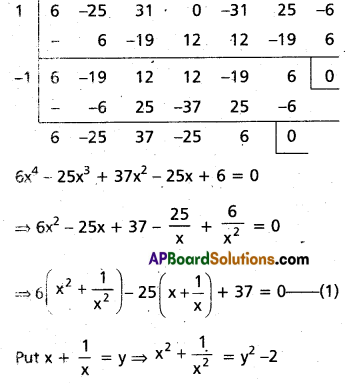
∴ (1) becomes 6(y2 – 2) – 25(y) + 37 = 0
⇒ 6y2 – 12 – 25y + 37 = 0
⇒ 6y2 – 25y + 25 = 0
⇒ 6y2 – 15y – 10y + 25 = 0
⇒ 3y(2y – 5) – 5(2y – 5) = 0
⇒ (2y – 5)(3y – 5) = 0
